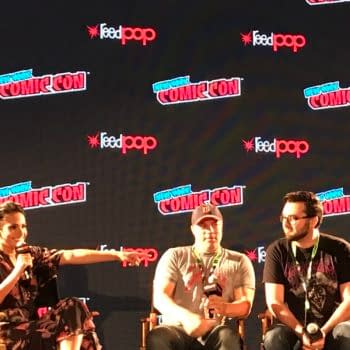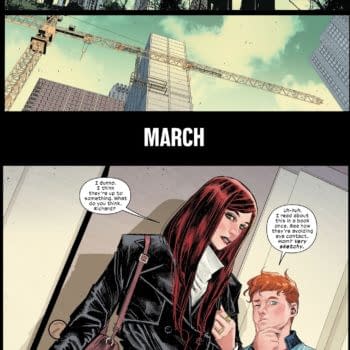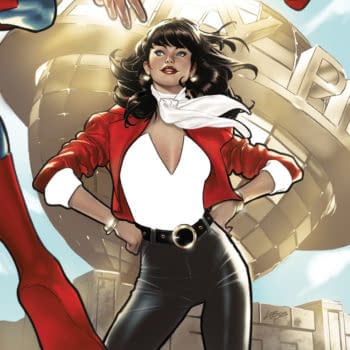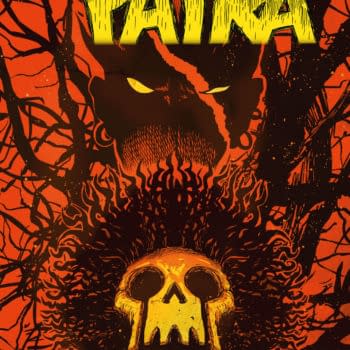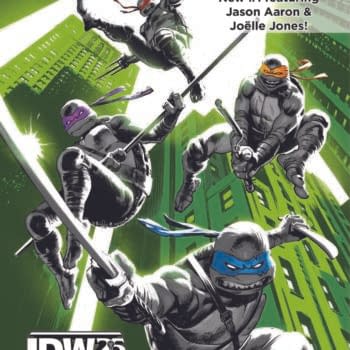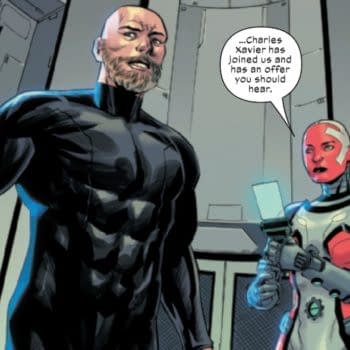Posted in: Comics, Recent Updates | Tagged:
The (11th) Doctor Is A Fabulously Problematic Creature- With Si Spurrier
I'm a massive Doctor Who fan. In fact, I'm coming right out and declaring myself a Whovian through and through. From the TV show and the audio stories, to the books and the comics, I do my best to keep up with the Doctor and his many adventures.
Currently, Titan Comics is doing marvellous work with the Time Lord. Many of his incarnations now have their own books, which is wonderful as it allows many generations of fans to read the Doctor of their choosing. Si Spurrier, along with Rob Williams, is penning the current adventures of the 11th Doctor, giving us a look into the time-traveller's history, the likes of which we hadn't seen before, at least with relation to the comics; more specifically, we got a look into the Time War. With that in mind, I was quite pleased to talk to Mr. Spurrier about his run on Doctor Who.
Octavio Karbank: Let's start with your relationship to the Doctor and what attracts you to Doctor Who.
Si Spurrier: Sure. I'll start with a confession: I wasn't really into Doctor Who for the majority of my life. I grew up during the hiatus, between Sylvester McCoy and the new Who stuff, so I never really had a Doctor of my own. When new Who came along I just sort of missed it and it wasn't until maybe five years ago that I started going out with my now-wife, that I started watching it. She was, and is, fairly active in the Doctor Who community; she works for Doctor Who Magazine. She's very cool and she got me back into it. I spent a lot of time watching the show and thinking there were several truly brilliant episodes and several absolute sinkers. Because I'm absolutely arrogant, my immediate thought was not, "I'm going to forgive the bad stuff and just like the good stuff because I like the character" but "hey, I should be writing this!" You don't just get to stroll in and do the TV stuff, but when the opportunity arose to do the comic I seized it with both hands. Say what you like about any individual story, the concept of the Doctor and the innate nobility of that character are so compelling and timeless. You can do anything you like with it and it will always come back to this troubled, almost-but-not-quite-human character, being very human, more human in fact, than the humans around him. It's a no brainier. As a writer who comes from a sci-fi background the ability to tell crazy sci-fi stories around this very well regarded character is lovely.
OK: Can you talk a little about your sci-fi background?
SS: Sure! I came into comics through 2000 AD, which, as your readers will know, is Britain's foremost science fiction comic. I don't know if this is true in the U.S., but in the UK they're the only publication that has a dedicated slot for new writers and artists; in my case I was at a convention at a "pitch fest", and I won it, and this was my first published gig. That grew into more work. At these pitch fests, you have to be trained to quickly deliver ideas at a hectic pace and make stories quite dense in a very value-centric way since you only have six pages to tell a story. That transfers very well to not just Doctor Who, but science fiction in general.
OK: Do you then think science fiction is important?
SS: Oh, god, yeah. Of course it is. An awful lot of what we call science fiction is an allegory of fantasy, and that's a whole other conversation, but I have issues with some of the terminology we use when we talk about genre. All the terms we use to describe different genre are actually describing different things, not just the stuff that matters about story. Science fiction is a remarkable way of saying things about ourselves and our world without having to say things about ourselves and our world. There is a layer of speculation, which is nonetheless grounded in science and that means it's always going to be more powerful that something which is pure fantasy.
OK: I guess my follow up question would be if you could explain the research involved in writing the Doctor Who sci-fi jargon.
SS: The approach we've taken with this arc is more of a long, single story, that starts in issue one and ends at issue fifteen. Things happen in the middle, rather than there being a story or monster of the week. There's not quite so much need for us to be constantly shifting to new science things. In terms of research, we knew there was going to an awful lot of jumping around in time and space. We knew there was going to be strange and exciting things that would be obstacles or help to the various journeys and arcs ongoing. Frankly, you can usually just summon something, "I need to find a thing that can allow the Doctor to go from A to Z". So I'll go spend a couple of hours on Google and find an amazing science-y thing that happened that fits the bill, and add in a twist of fantasy. It's easy to fall prey to "technobabble" and to be fair, they do that with their tongue in their cheek and we do that in our comic.

SS: One of the beauties of Doctor Who in general is that you have one character who is actually dozens of characters. People don't need to worry too much about digging too much into all the other versions of the Doctor if they just want to enjoy one Doctor. They're all played ever so slightly differently. The War Doctor, of course, is the most different of them all. It's a nice departure from the Matt Smith Doctor who I always think of as a Math professor from some community college who is very eccentric, very British, and bumbling, but has huge reservoirs of rage and cynicism and melancholy just below the surface. Then you have the War Doctor, who is out and out surrendered to all of those things. He is barely a Doctor that we can recognize. There's a lot of that in there, in his case, it is the rage and the melancholy that is on the surface and the good stuff, the Doctor-y stuff, that is way below. It's a nice subversion of the stuff we think we know about this character.
OK: You had the Doctor team-up with the Master, which is something we really hadn't seen before in Titan Doctor Who comics.
SS: We played it as a fun twist. The nature of this arc is that the Doctor is investigating a crime that he himself committed in a time and place he has no access to and no memory of; so he can't just hop back there to see if he really did do it. So he's constantly investigating, finding clues, and we begin to see into his old self, the War Doctor, accompanied by a small child and we assume it's a companion of some sort. Of course the twist is this is one of the incarnations of the Master…this wheedling, Machiavellian child who is with the Doctor. In the midst of a war, you need madmen. That's one of the themes of the whole thing, and in fact the big bads are a group of Daleks who are able to create and be chaotically creative because they're insane. The idea is wars are fought by soldiers, but they are won by madmen. So of course, during the Time War, you can bet the Doctor would team-up with the Master because they're enmity is nothing compared to the war that's ravaging the universe.
OK: In writing the Time War, was there anything you weren't allowed to include?
SS: The obvious thing, and this is hilarious considering we've told an entire arc about Daleks, is that you're not allowed to show Daleks, because the license for the Daleks is owned by Terry Nation, rather than the BBC. Anytime the Daleks appear on the TV show, somebody is paying a license fee for that. So we came up with this cabal of insane, eccentric Daleks who clothe themselves very differently and exist in strange states of metaphysics. They're not the Daleks as you know, but they are just Dalek-y enough.
OK: What can you say about what's coming up on your run?
SS: In closing out on this run, there were a lot of surprises in store for the last issue that finished with issue 15 of our run. Now we've started all over again with Season Three. I'm going to be one of a team for that one; we've changed things around for that one. We're doing adventure-of-the-week; I'm doing some, Rob is doing some, and there are a couple other guys doing some. There's a central plot we're playing with that I think hasn't ever been done in Doctor Who. I can't say anything about it, sadly.
OK: And what of Alice, the Doctor's current companion?
SS: We have a notion of why she eventually ceases to be the Doctor's companion. We're talking about a world in which you can only really see the Doctor and the universe through the eyes of the companion, so it is only sensible that you would start by knowing how that companionship is going to end. Is it because they die, because they stay behind, or because they choose to stay behind? Those are all pretty major events.
OK: Do you think you'd be a good companion to the Doctor?
SS: No. I'd be too jealous of him and constantly trying to steal his stuff!
OK: Finally, and we touched on this a little, but what does the Doctor mean to you?
SS: When I first got the opportunity to write him in this comic, my contrary, starting position was that the one thing nobody really acknowledges, even though it's right there, is that from the outside looking in, the Doctor is a fabulously problematic creature. He is a cackling, mischief-making, reckless god who goes smashing his way across the time-line, ruining people's lives, leaving chaos in his wake, disappearing before anyone has to clean up the pieces behind him. I know that's not a fair or accurate description of him, because as I said before, he's the most noble creature there is. Yet I wanted to begin the story by just facing up to this problematic thing and it literally starts with someone pointing at the Doctor and saying, "You are a reckless bastard! You're running our lives and it's time you pay for it." To answer your question, as a result of this arc, and it's a redemptive arc, he is the ability to always try to do the right thing and to self-doubt. I think there is nobody in the world who isn't better for having a little bit of self-doubt, but he will always find a way to be the right person who's needed at the right time. He's like the quintessential hero, because he's not perfect and he's not flawless, but he always finds a way to make stuff turn out right, despite those flaws.
OK: Thank you.
SS: Thank you.
Octavio Karbank is a writer and bona fide Whovian. Living in Massachusetts, you can find him on Twitter @TymeHunter and his blog www.cozmicventures.com







